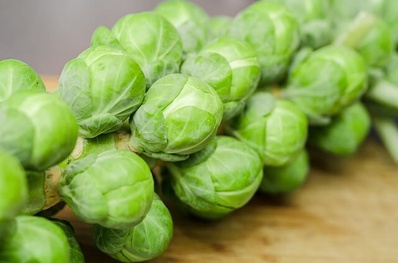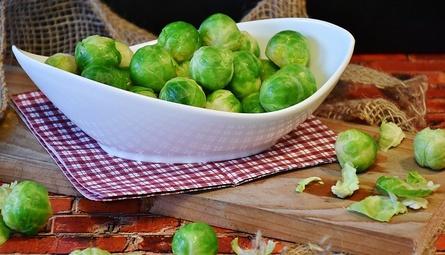Si vous cherchez un aliment extrêmement riche en nutriments, savoureux et facile à préparer, alors les choux de Bruxelles sont faits pour vous.
Ce petit spécimen appartient à la grande de famille des crucifères dont font partie le brocoli, le chou-fleur, le chou vert, blanc, rouge ou encore le chou frisé ou le chou chinois.
Bien que tous les légumes de cette famille soient connus pour leurs pouvoirs anticancer, les recherches ont démontré que les choux de Bruxelles sont plus efficaces que les autres.
Sous le règne des empereurs romains, il était cultivé en Italie. Mentionné l’une des premières fois vers 1200 en Belgique est précisément dans la ville de Bruxelles, il en gardera le nom.
Peu calorique, puisqu’une tasse de choux de Bruxelles cuits contient seulement 56 calories, il couvre pourtant près de 240 % de l’apport journalier recommandé (AJR) en vitamine K1 et près de 130 % pour la vitamine C.
Les choux de Bruxelles constituent également un bon apport de manganèse, de potassium, de choline et de vitamines du groupe B. Ils contiennent des fibres et même des protéines.
Mais l’éventail de ses vertus et de ce qu’il recèle ne s’arrête pas là…

Ce petit trésor de la nature se révèle très riche en antioxydants et autres composés actifs pour lutter contre d’importants problèmes de santé.
Parmi ses composants, les glucosinolates sont des molécules soufrées qui seront utilisées par votre corps afin de synthétiser des isothiocyanates qui activent les systèmes enzymatiques de défense contre les cellules cancéreuses. En fait, les composés du chou de Bruxelles induiraient le suicide des cellules précancéreuses.
In vivo, c’est-à-dire sur des organismes vivants, les isothiocyanates diminuent fortement la cancérogenèse (développement des cellules cancéreuses), et in vitro, ils favorisent l’apoptose qui est le processus naturel de la mort des cellules cancéreuses. L’avantage de ces composants naturels est qu’ils peuvent arrêter la croissance des cellules cancéreuses sans endommager les cellules saines. La prévention exercée par les choux de Bruxelles semble viser bon nombre de cancers y compris le cancer du côlon et des ovaires.
Une étude relate que des hommes qui mangeaient environ une tasse et demie de choux de Bruxelles tous les jours pendant cinq semaines ont manifesté une diminution de 28 % des dommages de leur ADN, ce qui, selon les chercheurs, serait directement lié à la consommation de ces légumes de la famille des crucifères.
Cette superstar des légumes « anticancer » ne se limite pas à cela
Les choux de Bruxelles sont également très utiles pour la prévention des maladies chroniques en raison de leur rôle détoxiquant. C’est ce que confirme la Fondation George Maateljan qui affirme que le pouvoir de détoxication des choux de Bruxelles est exceptionnel. Les preuves ont été apportées grâce aux études humaines démontrant le lien entre le système enzymatique cellulaire et les glucosinolates présents dans les choux de Bruxelles.
Le deuxième atout de ce légume est qu’il contient des nutriments à base de soufre. Rappelons que le soufre aide soutient le corps dans ses mécanismes de désintoxication.

Un troisième argument relève du fait que lors de désintoxication, notre corps nécessite un apport d’antioxydants, apport que peuvent également fournir les choux de Bruxelles puisqu’ils constituent une excellente source de vitamine C et de manganèse.
Il est actuellement prouvé que les nombreuses toxines environnementales peuvent endommager notre ADN. Au vu de la grande variété de phytonutriments, d’antioxydants, y compris des flavonoïdes, que contiennent les choux de Bruxelles, on comprend qu’il soit protégé par cet aliment.
Quand on parle d’aliments antioxydants ou anti-inflammatoires, peu de gens pensent aux choux de Bruxelles et pourtant…
À la vitamine C s’ajoutent d’autres composants moins connus qui ont pourtant toute leur importance. Ainsi le kaempférol, l’isorhamnétine et l’acide férulique sont des composés soufrés qui permettent de contrer le stress oxydatif chronique. Ce dernier est un acteur du vieillissement précoce, mais aussi un facteur de risque majeur pour le développement de nombreuses autres pathologies.
Toute inflammation est propice au développement de problèmes cardiaques, y compris la crise cardiaque et l’athérosclérose. Des principes actifs tels que l’isothiocyanate ou le sulforaphane dérivé du glucoraphanin (un glucosinolate) sont des molécules anti-inflammatoires particulièrement intéressantes et présentes dans les choux de Bruxelles.
Voilà pourquoi ce légume c’est une activité anti-inflammatoire générale, plus particulièrement sur le système cardio-vasculaire puisque ce chou est en mesure de prévenir, voir même, de diminuer les dégâts au niveau des vaisseaux sanguins.
Pensez donc à intégrer régulièrement les choux de Bruxelles à vos menus. C’est un aliment savoureux et très polyvalent qui peut se cuisiner de manière très diverse.
Comme pour tout légume, il est préférable de les choisir d’origine biologique et d’éviter de les cuire trop longtemps ou à trop haute température afin d’en sauvegarder un maximum d’éléments nutritifs, mais aussi afin d’éviter d’en modifier le goût. Si après leur cuisson vos choux de Bruxelles sont ramollis, s’ils ont perdu de leurs couleurs vives ou s’ils sentent trop fort, c’est qu’ils sont probablement trop cuits.
Idéalement, ils doivent être vert clair est présenter une texture légèrement croquante à la de noisette.
Cuit à la vapeur, vous pouvez le mélanger à de l’huile d’olive et du parmesan. En petits morceaux rissolés il sera délicieux jeté au cœur d’une salade avec des oignons, de la feta, du vinaigre balsamique ou un jus de citron et arrosé d’un filet d’huile d’olive. Un bol de petits choux assaisonnés de sel et de poivre aux frais dans le réfrigérateur vous permettra d’en grignoter à votre guise à fin de bénéficier de leurs nombreux bienfaits tout au long de la journée.



